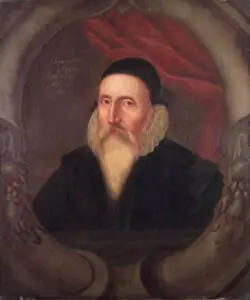
Those of you who are interested in John Dee will be interested in reading Robert Parry’s article “John Dee and the Invention of the Telescope” in which Robert examines whether John Dee actually had a part in the invention of the telescope and whether he should be given some of the credit. After presenting compelling evidence, Robert concludes:-
“In conclusion, and keeping in mind John Dee’s life-long interest in the stars, it is inconceivable in my view, that he would not have used his understanding of optics and perspective glasses to turn a rudimentary telescope to the heavens at some time during his long career as a scientist in Elizabethan England. The assertion in many of our history books that in 1609, the Italian astronomer Galileo was the first person to turn a telescope to the heavens to observe the moon, stars and planets is possibly more than a little inaccurate. The year 1609, coincidentally, was the year in which John Dee died.”
What a shame that the general public have never heard of this influential scholar, a man who was a trusted adviser to one of the greatest monarchs England has ever known, Elizabeth I.
Robert Parry is author of “Virgin and the Crab”, one of my favourite historical novels.
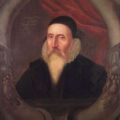
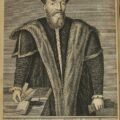
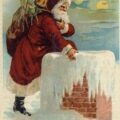
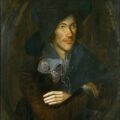
Worthless speculation. Odd that the work of a true genius like Gallileo can be pissed on … from below.
Dee probably had a hand in the invention of the internal combustion engine as well – while taking a break from screwing the gullible with his weird prognostications. Overall, he strikes me as an unpleasant piece of work. Maybe his influence on Alisteir Crowley is worth exploring.
Edward Kelley’s story would be more interesting – has it been done?
shtove,
You may find it worthless speculation but I found Robert’s article really interesting and John Dee is one of those Elizabethan characters who fascinates me. You’re right, Edward Kelly is another interesting man and I haven’t yet written an article on him.
Please can we try and keep comments polite and respectful. Thank you.
I, too, am fascinated with John Dee who was not a quack at all but extremely well-respected in his day. Remember, the Tudor age did not have our scientific advances. It was a time, a bridge really, between the superstitious Medieval times and our own modern age. It was a time when astrology and astronomy could coexist as equal sciences. When chemistry included alchemey and the world was filled with discovery, both geographically and scientifically. That’s one of the most fascinating things about this period for me anyway. And Edward kelly is really something! All the wife-swapping, etc. A bit bizarre to say the least! Thanks Claire and Robert.
I think it is quite likely that John Dee may have experimented with an early form of a telescope but I doubt he published his work the way Gallileo did. The idea that only one person could have come up with an idea is often not the case but the person who gets the most press and attention, so to speak, is often credited as the original inventor.
My firm prediction is that after 350 years of appalling neglect, this man will one day soon be hailed as one of the greatest and most influential minds in history
Again we see him crawl through the ravages of British neglect and discover that at the very least his scientific library proved pivotal to Thomas Digges’ experiments in inventing/co-inventing the Telescope through the work of Dee’s fellow countryman, David Dee of Radnor, Wales
It appears that Mr Ap Harry’s, sorry Mr Parry’s article gives greater credence to the notion that John Ddu was pivotal, if not the actual inventor of the telescope in or before 1570. He published little but circulated his manuscripts. Ah again, perhaps then the father of shared science as well!?
Certainly the possessor of one of the most brilliant yet beautiful minds of all time
He may kave invented the word British Empire but his humanitarinism should become legendary; ’cause no harm to offers’
On that beautiful Welsh note, I gracefully withdraw my precence and wish you all the most virtious and enlightened of times, in your life’s journey
yours most Respectfully
Neil Ap Jones
Hi Neil,
Tahnk you so much for your comment. I find John Dee such a fascinating character and Elizabeth I was fortunate to be surrounded by such incredible men, men of wisdom and learning and men who were devoted to her. Have you read Robert Parry’s “Virgin and the Crab”? It’s wonderful, all about Elizabeth and John Dee and Elizabeth’s struggle for the throne.
Young Lady…..hi
No , I am ashamed to say I have not but I have very briefly communicated to Mr Parry
My apologies for the delay. My computer has been down for three weeks; Life was not worth living!!. Yet here again we are Donald W Daviesing and all is well!!
Yes do keep in touch
Lovely communicating with you
Neil
I have completed a biography of John Dee based on many original manuscript sources. ‘The Arch Conjuror: John Dee’ will be published by Yale University Press in February 2012. It includes much new information about Dee. He did in fact possess a telescope, a ‘perspective glass’, which ‘could make things far off, to seem near, small things to seem great’, though it was probably rather a crude one. He surrendered it to Edward Kelley in early December 1588, trying to curry favour with Kelley to avoid being shut out of Kelley’s increasingly successful alchemy. Kelley gave it to the Emperor Rudolf II.
Glyn, I can’t wait to read your biography of John Dee as he is a man who fascinates me. Please do let me know if you’d like to write a guest article for the website.
It is said that Dee used a symbol like 007 in letters to Elizabeth I. But where is the proof?
From where did such an idea first spring?
anyone?
Tom C
He signed his letters to Elizabeth I and her council with the cipher 007. See http://johndee.ash.com/ and http://www.sirbacon.org/links/dblohseven.html for more information.
John Dee is indeed a hero of history! In fact, I found this site while doing further research for a modern portrait I’m painting in his honor. Thanks for the illuminating ideas.